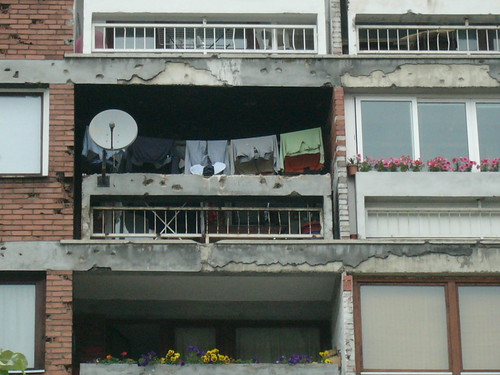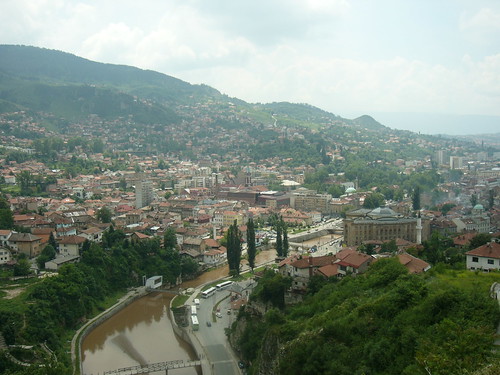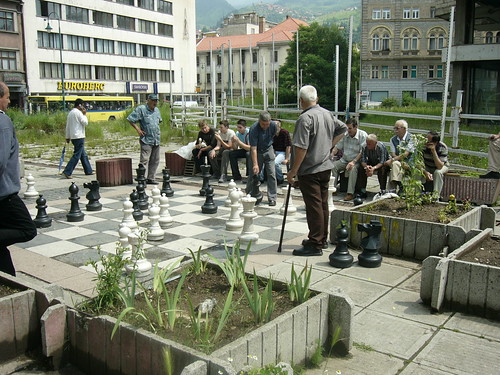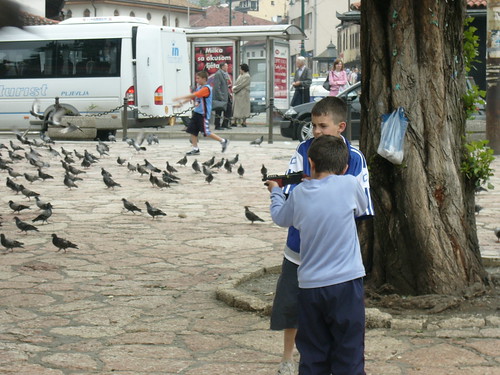Who would have thought that bombs, death and bullet holes in buildings would ruin a city? And when I say ruin it, it has nothing to do with war – but tourism!
I spent four nights in Sarajevo, and a night in Mostar – where both cities are beautiful in themselves, but whose local economies are inflated by international organisations, and the European Union has created a facade of a well-functioning country that is actually run by the mafia. In between dodging landmines, putting up with Americans at the hostel who get defensive on discussions about their screwed up economy, and seeing money flow out of my hands like I was in a western nation, I feel like I have learnt little about Bosnian culture despite staying for nearly a week. Although as the Serbs had me believe, there is nothing to learn, because Bosnians are just Serbs that happen to pray with their bums up, five times a day. Hmm, I don’t know about that.
When you enter Bosnia, you don’t need a sign to tell you, because the change in landscape could not be more dramatic. From flat, green Serbia to mountainous Bosnia, with farmers at times growing their crops at 45 degree angles! Bosnia and Herzegovina are geographic terms, with the later suddenly becoming flatter and drier, reflecting the intense heat that resembles the Croatian climate as opposed to the colder inland climate.
Dotted along the terrain are cities bearing the scars of war – that one-by-one, and totally unsuspecting to the local population, were sieged by Croatians and Serbians, as communications were broken between cities during the war. The modern historical term is genocide, with the number of deaths totaling 250 000. And our world let this happen for four years, before something was done about it. My tour guide in Sarajevo ended his talk about the war with a joke, which he said we should interpret as we want to, but clearly illustrates the commonly held view as to why the West did not act sooner: a Bosnian was digging a hole. He kept digging and digging, and then a friend of his asked what was he doing. “I’am looking for oil”. Apparently one Iraqi’s life, living in an oil rich nation, is worth a lot more than a person living in a oil-poor country. Reminds me of what is happening in Africa today, and how we all choose to be ignorant on the crisis there

The tour guide had a bone to pick with the United Nations, and his anger illustrates how the UN was designed for a bi-polar world, and how its peace keeping efforts are inadequate in the modern world. A Swedish woman whom I met on the road, was telling me during the war that her boyfriend was in Bosnia with the UN forces, and he came back fatter than when he left! The reason being, the UN effectively could not do anything, and they just sat there watching with their hands tied behind their backs. So he just spent his days, drinking and eating, and basically having a holiday, whilst 1600 of Sarajevo’s children were murdered. The city of Sarajevo was under heavy siege for 3 1/2 years, and yet it took NATO 5 days to bomb the surrounding Serb forces into withdrawal.
Another story that made me sick with disgust, was with the media. There is apparently a Frenchman, who filmed a woman dying on the streets. Rather than help her, he just kept filming – and in America has been awarded with a Pulitzer price. Another story is how journalists would pay children to run across “sniper alley”. The infamous Sniper Alley as a road that runs alongside the river Miljacka in the middle of the town. The Serb forces sat on the surrounding hills, and one-by-one killed civilians. Read more about the seige here.

It was interesting to hear about life during the war. The top item on the black market was make-up! An advantage touted of war, is that there is no television! As such, Bosnians are extremely well read, and once done, would use these books for winter fires. But more so, it was interesting to hear about Bosnian spirit during the war. Every man and woman was fully mobilised during the war, and they never let their spirits down. A joke that illustrates Bosnian humour is as follows: A Bosnian is on a kids swing, moving back and forth, when another Bosnian yells out “what are you doing?”. To which the first Bosnian replied “just fucking with a sniper”.
Whilst the Bosnians have a sense of humour, deeply rooted in sarcasm, I also found the youth to be wild. I caught a cab from the bus station to the town centre, and at one point a tram was running beside us. On the back of the tram was a metal plate/bar, which I suppose is used to tow the tram with a truck. However, what I saw was a little boy of about eight sitting on it, making broom broom sounds like he was car racing! Just above him, on the back right of the tram, a little girl with her friends, was sticking her leg out whenever they passed a pole or a person! My view that the youth of Sarajevo are wild was further impressed by the sight of the kids playing in the main square of the old town. As I sat there eating my burek, a bunch of boys were shooting at each other with toy guns. I know they are just toys, but seeing as the country is still trying to rebuild itself from war, I was really bothered by that sight. I am not sure why you need to know all that, but it really made an impression on me watching these kids act the way they did.
Sarajevo has become the focus of world attention three times in recent history: the assassination of Archduke Franz Ferdinand, that sparked World War I, the 1984 Winter Olympics, and the Balkan war in the 1990s that left 11,000 people in Sarajevo dead. Despite the tour operator’s best efforts to talk up the city due to its great alpine scenery which made it suitable for the Olympics, he knew that the only reason why people came to his city was because of the war. You could feel how this annoyed him, when he clearly let it be known that the only time we would ask questions about the war was when we were at the Jewish cemetery. After giving us a 10 second period to ask questions, he said “Okay, question time over. Lets go.” The war is still very recent memory, and every family was affected, he would tell me a little later just between the two of us. But they are trying to move on, and the impression I have that they want to move on, and leave the past behind. I don’t see that as unreasonable! So whilst tourism is helping inject money into economies of the main cities, the actual reason for this tourism, is going to mean the pain of the past will not disappear quickly enough.
The country is actually divided into two countries: The Bosniak/Croat Federation of Bosnia and Herzegovina and the Bosnian Serb-led Republika Srpska (RS). The Federation and RS governments were charged with overseeing most government functions.”Democracy” exists, under the supreme authority of Paddy Ashdown, who runs the Office of the High representative in order to implement the civilian side to the government, on a mandate from the UN Security Council. However our main man Paddy has come to admit that his job now, is to be able to abolish his job! It will be a long road for Bosnia, but with such a strong EU investment, there is potential. A five-year plan to eliminate the heavy presence of international military officers, began last year. Here is hoping that when they leave, security will be a non-issue (they still have to sort out the fact that the country has 16 police forces) and that they get what they really need – foreign investment – to rebuild this extremely fragile country.

One story worth mentioning is a night out we had in the city. The girls in the hostel where whining about sitting around, and wanted to hit the town for some night clubs. So after we sculled our bottle of beer (two litres for three Aussie dollars…and yes, it tasted every bit of the cheapness) we headed for some clubs. However on the way, we heard music from a shop along the road. It was a sort of bar, with about 20 people that were in the 45 to 65 age group. The Americans with me were shocked at the atmosphere (which I felt was very similar to Greece). The “oldie’s” would buy us drinks, and have us wiggle our bums, dancing to that oriental music infused by the Ottomans when the Balkan peninsula was under its rule. And as we would dance and dance, and speak in broken English, every so often they would tell us why they were so happy. “It is not 1992-1995 anymore. It is not 1992-1995 anymore. Let us celebrate!”. Whether it be war or peace, the Bosnians still know how to laugh.
Further reading, found by a fellow traveller:
http://www.boyntonweb.net/Policy/Balkan/Bosnian.htm

